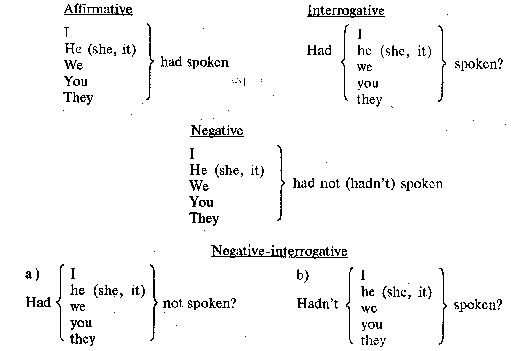
35
§ 36. As follows from the meaning of the past continuous and from its uses described above, it cannot
denote a succession of past actions. Two or more verbs having the form of the past continuous, whether used in
the same or in adjoining sentences, always denote simultaneous actions performed by different persons or non-
persons:
Nash made periodic appearances in the town but what he was doing and what traps the police were setting, I
had no idea.
It was a glorious day. The sun was shining high in the sky. There was no wind. The larks were singing in the
blue depth. Only far away, over the horizon, soft milky clouds were moving placidly towards the east.
In all its uses the past continuous is translated into Russian by means of the past tense of the imperfective
aspect.
The past perfect
§ 37. Formation. The past perfect is formed analytically by the auxiliary to have in the past indefinite and
participle II of the notional verb. The interrogative and negative forms and built in the way usual for all
analytic forms.
The paradigm of the verb in the past perfect
§ 38. In all its uses the past perfect denotes actions the beginning of which (always) and the end (usually)
precede a certain moment of time in the past. The prepast period of time to which the actions in the past perfect
refer is unlimited, that is, they may take place either immediately before some moment in the past or in the very
remote past.
This tense is used with both actional and statal verbs. Its sphere of application is mainly that of narratives,
though it is also used in conversation.
The past perfect is used:
1. To denote an action of which both the beginning and the end precede some moment of time in the
past. This moment can be specified by an adverbial of time, or by another action, or else by the situation.
What should be borne in mind is that the use of the past perfect form is in itself a sufficient indication of the
precedence of the denoted action to some moment in the past which therefore need not be specified.

